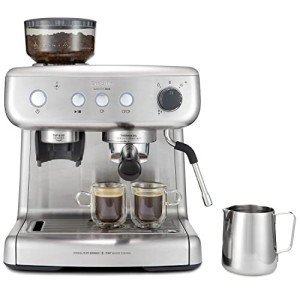5 Clarifications On Energy-Efficient Espresso Machines
Energy-Efficient Espresso Machines: A Comprehensive Guide
In the world of coffee lovers, espresso machines are often considered essential home appliances for brewing abundant, aromatic coffee. However, Get Source related to these machines can lead to increased utility bills and environmental issues. As consumers end up being more eco-conscious, energy-efficient espresso machines have become a popular option. This article aims to check out the functions, benefits, and choices offered in energy-efficient espresso machines, assisting coffee lovers make informed options.
What Makes an Espresso Machine Energy-Efficient?
Energy-efficient espresso machines are designed to reduce energy consumption while keeping optimum performance. A number of functions add to the energy performance of these machines:
Insulation: High-quality insulation helps keep heat, minimizing the energy required to maintain optimal brewing temperatures.
Smart Technology: Many modern machines are equipped with programmable settings that allow users to arrange developing times and switch to standby mode when not in use.
Quick Heat-up Time: Energy-efficient espresso machines often use sophisticated heating technologies, such as thermoblocks or PID controllers, to heat water quickly.
Low Wattage: Machines that operate at lower wattages consume less energy overall, making them more effective.
Vehicle Shut-off: Automatic shut-off features ensure that the machine switches off after a particular period of lack of exercise, additional reducing energy waste.
Benefits of Energy-Efficient Espresso Machines
Purchasing an energy-efficient espresso machine can use numerous advantages:
Cost Savings: Over time, lower energy intake can cause decreased electrical energy expenses.
Ecological Impact: Using less energy lowers carbon footprints, making these machines a more sustainable choice for environmentally mindful consumers.
Enhanced Performance: Many energy-efficient models also use superior developing technologies, leading to better-tasting espresso.
Toughness: Typically, energy-efficient machines are developed with high-quality parts, leading to higher longevity.
Functions to Consider
When picking an energy-efficient espresso machine, several features need to be taken into consideration:
- Type of Machine: Options include manual, semi-automatic, and totally automatic models, each with varying degrees of user control and automation.
- Brew Quality: Look for machines that make use of high-quality brewing systems to guarantee optimum taste extraction.
- Maintenance: Some machines have self-cleaning features that can save energy and effort in upkeep.
- Capability: Depending on personal or household size, machine capability can impact energy usage, with larger machines typically needing more power.
Popular Energy-Efficient Espresso Machines
The market provides a variety of energy-efficient espresso machines accommodating various requirements and choices. Below are some notable models:
Brand
Design
Secret Features
Energy Consumption
Breville
Barista Express
Integrated grinder, PID temperature level control, fast heat-up.
Low
DeLonghi
EC155
Compact size, simple to use, resilient build.
Moderate
Rancilio
Silvia
Heavy-duty design, outstanding temperature stability, and has a low ecological effect.
Moderate
Gaggia
Classic
Reputable manual operation, long lasting brass components, and effective steaming capability.
Low
Jura
E8
Completely automatic, clever functions, and a removable brew group for simple cleaning.
Low
Tips for Optimal Energy Efficiency
Aside from picking an energy-efficient model, customers can embrace a number of practices to optimize energy efficiency:
- Preheat: If your machine has a preheating function, use it to make sure that the optimal temperature is reached rapidly before brewing.
- Shut off After Use: Always turn off the machine after brewing or use machines with automobile shut-off functions.
- Regular Maintenance: Keep the machine properly maintained to ensure it operates effectively and successfully.
Frequently Asked Questions About Energy-Efficient Espresso Machines
1. Are energy-efficient espresso machines more costly?
While the initial financial investment might be greater for energy-efficient designs, the long-lasting cost savings on electrical power costs can offset the preliminary expense. Furthermore, numerous energy-efficient machines included innovative features that improve the developing experience.
2. How do I understand if an espresso machine is energy-efficient?
Search for signs such as Energy Star accreditation, user reviews, and requirements concerning wattage and heat-up time. Machines with particular functions focused on decreasing energy consumption are normally designed for much better performance.
3. Can Espresso Machines Under £500 use an energy-efficient espresso machine for other coffee designs?
Lots of energy-efficient espresso machines offer adaptability, enabling users to brew different coffee designs beyond espresso, such as lattes and coffees, by incorporating steaming capabilities.
4. Do energy-efficient models sacrifice quality for effectiveness?
Not necessarily. Many energy-efficient espresso machines are geared up with high-quality brewing technology that can boost taste extraction while lowering energy intake.
5. What maintenance is needed for energy-efficient espresso machines?
Regular maintenance includes cleaning up the machine, descaling when needed, and periodically checking seals and gaskets to guarantee optimal performance and energy performance.
Energy-efficient espresso machines represent a perfect mix of efficiency, cost savings, and ecological duty. By considering numerous functions, benefits, and brand names, consumers can select a model that fits their special preferences while contributing favorably to the environment. As the trend toward sustainable living grows, the popularity of energy-efficient appliances, including espresso machines, is most likely to continue its upward trajectory, offering coffee enthusiasts a guilt-free method to enjoy their daily dose of espresso.
